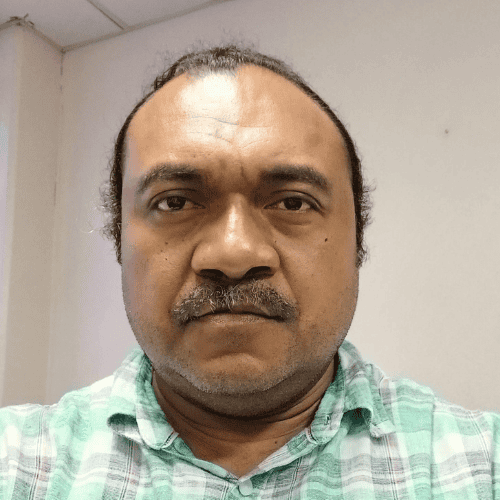
DTP alumnus Sara Bulutani Mataitawakilai, who prefers to be called and is commonly known in the local civil society sector in Fiji and his local communities as Bulu, is a seasoned Indigenous Fijian community development practitioner, community leader, and traditional knowledge advocate. Bulu is an adviser to a local Indigenous womens’ NGO called the Na I Soqosoqo Vakamarama I Taukei Cakaudrove in Cakaudrove Province Province, on Vanua Levu, Fiji. This is his fourth month as Local Project Coordinator & Community Liaison Officer for the NaVualiku Project at the Ministry of Tourism and Civil Aviation. Based in Vanua Levu, this $200 million World Bank-funded project supports sustainable tourism, ecotourism, and infrastructure development for Vanua Levu.
About the project, Bulu said that:
“Our work supports sustainable tourism development on the island of Vanua Levu including MSMEs [Micro, Small, and Medium Enterprises] such as those venturing into community based tourism, cultural tourism and women focused cultural enterprises,” he says. “It’s about promoting what they own—their identity and their land—while ensuring sustainability.”
Bulu began his professional journey as a primary school teacher and later went on to study a postgraduate degree in governance studies at the University of the South Pacific. “That’s where I was introduced to the civil society sector,” he says. This led him to the Citizens’ Constitutional Forum (CCF), where he worked as a human rights and governance trainer before he was employed by the I Taukei Affairs Board as Assistant Roko Tui and later as Roko Tui Cakaudrove. In July 2015 he rejoined CCF to replace Reverend Akuila Yabaki as as its new CEO.
CCF is a prominent Fijian NGO that works on issues like community education, advocacy, good governance, human rights, and multiculturalism. Bulu came to know about DTP as both DTP and CCF were already in a long term partnership.
“The partnership between CCF and DTP dated back to the days of the Timor-Leste independence movement,” he recalls. “When I became CEO in 2015, I didn’t just attend DTP training—I continued and strengthened the partnership. That’s how we brought the first DTP training programs for the Pacific to Fiji.”
Bulu participated in DTP’s annual Human Rights and Peoples’ Diplomacy Training Program in Dili, Timor-Leste and found the training a transformative experience.
“It had a lasting impact on me,” he reflects. “It helped build my capacity as a CEO of a leading human rights and good governance NGO in Fiji. It helped me not just professionally—but as a person, as a leader. It reshaped how I viewed leadership, especially through the lens of good governance.”
He highlights specific DTP sessions that left a mark on him.
“The human rights and business component stood out. We explored how to apply rights-based frameworks to issues like the treatment of migrant workers. It helped me understand how global mechanisms work—especially the UN system, the Universal Periodic Review, and how civil society can engage with those processes.”
“Even now, when I’ve returned to the grassroots—to my farm—I can confidently speak about UPR, the UN, and international human rights. I use that knowledge to raise awareness in the community, to educate people who often have misconceptions about human rights.”
Beyond his government role, Bulu supports and advises the Na I Soqosoqo Vakamarama I Taukei Cakaudrove. Since 2020, he’s helped secure over FJ$350,000 in grants, led strategic planning, and supported sustainable agriculture through the revitalisation of traditional knowledge.
DTP acknowledges the traditional custodians of the land on which we work, the Bedegal people of the Eora Nation. We recognise their lands were never ceded, and we acknowledge their struggles for recognition and rights and pay our respects to the Elders – past, present – and the youth who are working towards a brighter tomorrow. This continent always was and always will be Aboriginal land.
Aboriginal and Torres Strait Islander peoples should be aware that this website contains images or names of people who have passed away.
DTP acknowledges the traditional custodians of the land on which we work, the Bedegal people of the Eora Nation. We recognise their lands were never ceded, and we acknowledge their struggles for recognition and rights and pay our respects to the Elders – past, present – and the youth who are working towards a brighter tomorrow. This continent always was and always will be Aboriginal land.
Aboriginal and Torres Strait Islander peoples should be aware that this website contains images or names of people who have passed away.
Privacy Policy | Terms of Use | Disclaimer | Policies
© 2022 Diplomacy Training Program | ABN 31 003 925 148 | Web Design by Studio Clvr